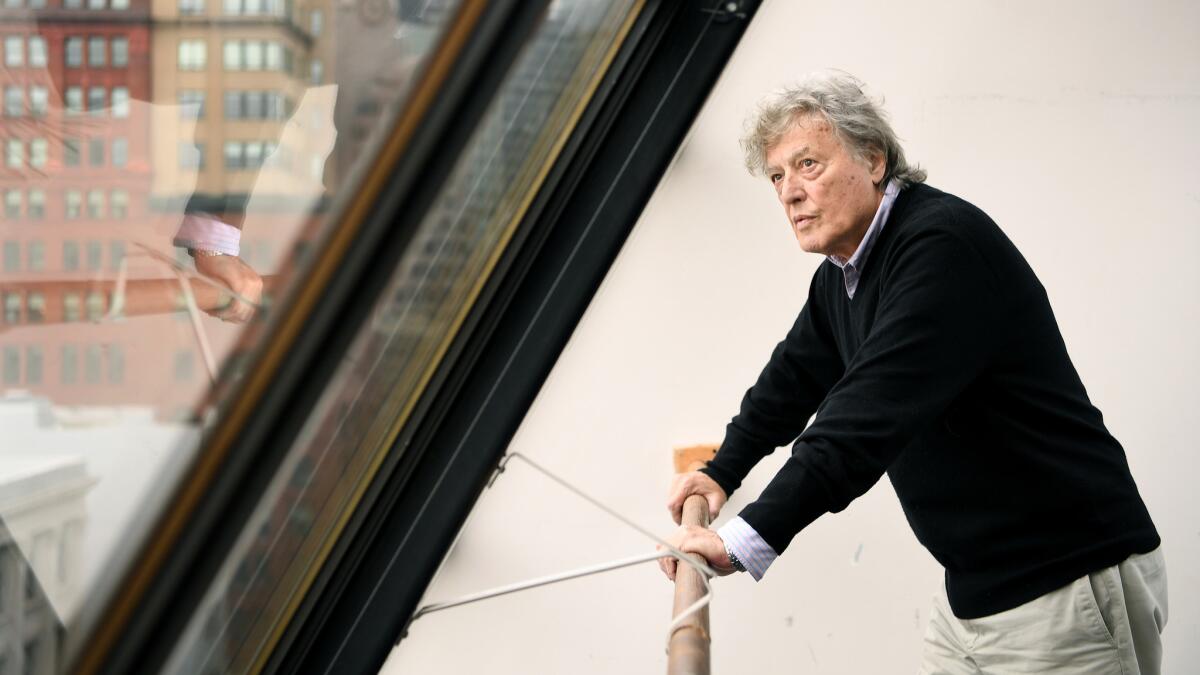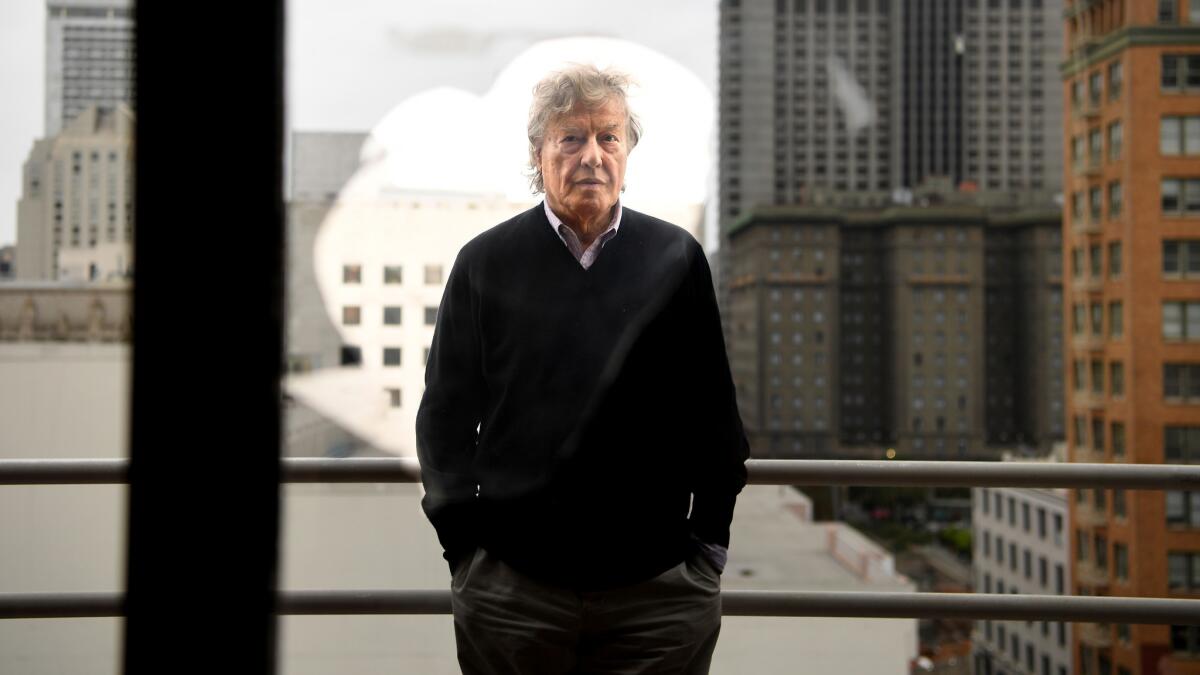With his first new play in nearly a decade, Tom Stoppard aims to ‘stretch your mind just a little bit’

- Share via
“I don't think I've ever spent half an hour in my life doing research,” said playwright Tom Stoppard when asked about the impressive erudition behind his intellectually dazzling comedies.
“I've spent many, many days of my life reading for pleasure in order to inform myself about something,” he explained, underscoring the point that theater for him is primarily a recreation and not a schoolhouse activity.
Storytelling is Stoppard’s trade, and the challenge of ordering material to keep an audience rapt is the heart and soul of his artistic enterprise. Naturally, he formulated the thought more elegantly: “To unfold and fulfill an entertaining narrative about something for which you might have to stretch your mind just a little bit.”
Stoppard was in San Francisco to check in on rehearsals of his latest play, “The Hard Problem,” which has its official opening here at the American Conservatory Theater on Oct. 26 under the direction of Carey Perloff, the theater’s artistic director, who has staged a good many of Stoppard’s plays, including “Arcadia” and “Indian Ink” twice.
Sir Tom appeared jet-lagged when we talked this month. The Czech-born British dramatist and Oscar-winning screenwriter (“Shakespeare in Love”) whom some consider to be the heir to Oscar Wilde had enough energy to deliver his signature bon mots. But they were served underhand, making it easy for an interviewer to underestimate them before realizing he had just been aced.
In his lush cashmere sweater, the handsomely weather-beaten 79-year-old looked like a professorial Mick Jagger who had recently entered his emeritus years. He confessed while having a quick smoke on the terrace before getting his picture taken that his mind was still partly back in London, where a revival of his play “Travesties” was about to open at the Menier Chocolate Factory.
He needn’t have been worried about the reviews, which have already generated talk of a Broadway transfer. “An enduring, life-enhancing play that brims with intellectual gaiety,” wrote the Guardian’s Michael Billington of Stoppard’s 1974 play inspired by the discovery that Lenin, James Joyce and the Dadist Tristan Tzara all happened to be living in Zurich during World War I.
Not many playwrights would have thought to turn this confluence of epochal sensibilities into a farce, but Stoppard has a gift for finding humor in the most rarefied scenarios. “The Hard Problem,” the first new play he’s written in nearly a decade, turns a neuroscience institute into a natural setting for comedy.
The profound question being debated here — is consciousness no more than brain tissue and, if so, is altruism merely the product of evolutionary biology? — has brought Stoppard into public colloquies with scientists and philosophers investigating this quintessential 21st century conundrum.
SIGN UP for the free Essential Arts & Culture newsletter »
A couple of hours after our interview, Stoppard was on a panel at A.C.T.’s Geary Theater with UC Berkeley psychology professor Linda Wilbrecht, whose research focuses on behavioral neuroscience and cognition. Stoppard, always up for intellectual badminton, posed the kind of questions that drive his play’s protagonist, Hilary, a research psychologist, to challenge the orthodoxy of her hard-science peers.
“How does gray matter, stuff inside your skull, get from being matter to … let’s say ‘Ode to a Nightingale’?” the playwright asked, deciding to go with the Keats poem after “mother-love” seemed all too biologically explicable. “How does matter account for our inner lives, for the movie that is going on inside our minds at every waking moment? How does stuff engender nonstuff?”
With subject matter this engrossing, a play can easily be eclipsed by the discussion it sets in motion. The London reviews of “The Hard Problem” were mixed. Stoppard said he was open to tinkering with the play while in San Francisco (“a play is never finished when I’m in rehearsal”) but that he’s satisfied with the work and pleased with the enthusiastic response of London audiences.
“When I'm close to a production, it's nice to make myself available in some role other than curator of the script,” he said, luxuriously rolling his Rs like a country squire. “In that sense, the script of ‘The Hard Problem’ is still shimmering with potential, but at the same time I don’t think of this period as being promoted into the text for the next people who do it. It’s just for us.”
The interview was conducted in Perloff’s office, with Perloff picking up conversational threads and Stoppard making even banal replies sound like ripostes through the soothing purr of his voice. At one point the talk became two-way traffic between the playwright and the director, who seemed to be working out their positions on the prospect of script changes.
[Scene: An interviewer momentarily finds himself in a tense standoff between a famous playwright and his strong-willed director.]
Perloff: We just did “Indian Ink” again last year and you rewrote the end, and you actually solved the play. I think when you publish it again, that should be the play.
Stoppard: I know.
Perloff: It's much better.
Stoppard: I think it was an interesting alternative. For some reason, I didn't think that I should now call the publisher and say, "Can you pulp those because I've got a new ending."
[Interviewer gently tries to direct the conversation to another topic.]
Stoppard: Carey thinks “The Hard Problem” is a little underwritten. All my life I have had coming at me, “Your play is a little overwritten.” It's the first time I've been with somebody who's saying, “No, it's a bit underwritten.” That's happening because I sat down to write it briskly. As a theatergoer, I became envious of the people who didn't have an intermission.
Perloff: It's such a thing now — it has to be 90 minutes with no intermission.
Stoppard: Well, it's 100 minutes. The thing is that I realized that the intermission was my least favorite part of the entire process. The intermission with that awful sentence, “How do you think it's going?” I mean, what a downer. Do you really want to think about that moment?
[General laughter]
Stoppard cont.: Anyway, I did want to write a play without an intermission and at the same time, I didn't feel so arrogant about it that I would say to an audience, "Well, you're not going to have the intermission but I'm going to write as much as I want and if it means that you're sitting there for two and a half hours, good luck."
The unguarded nature of their dialogue, with two devices recording their every word, was a testament to Perloff and Stoppard’s closeness. That evening, Stoppard publicly thanked Perloff for bringing him back so regularly and quipped that he enjoys what the English call “a special relationship” with A.C.T.
His history at the theater dates back to the 1968-69 season, when A.C.T. founder William Ball directed the play that launched Stoppard’s international career, “Rosencrantz and Guildenstern Are Dead.” It was a congenial match between a sophisticated, sneakily subversive playwright and a bright, bohemian city.

Stoppard’s early plays, which include “Jumpers” and “Travesties,” are acrobatic comedies of ideas in which the debate is moderated by a Beckettian sensibility that takes mischievous delight in knowing that no side can ultimately prevail. An early criticism was that Stoppard’s playwriting lacked sufficient warmth and that the relentless cleverness could be fatiguing.
The conventional wisdom is that Stoppard discovered emotion in his 1982 play “The Real Thing.” A decade later, beginning with “Arcadia” in 1993, he supposedly had another breakthrough involving intimations of mortality, which are particularly pronounced in “The Invention of Love” (1997) and, in what some consider to be his most personal play, “Rock ’n’ Roll” (2006).
Perloff has no patience for this line of thinking: “It’s such a cliché, it drives me nuts. When we did ‘The Real Thing,’ everybody, and I read all the original London reviews, said, ‘Oh Tom Stoppard has a heart. I'm like, ‘Really? You didn't see that before?’”
Stoppard, however, conceded that there was some truth to the generalization: “I completely understand how it's arisen. I can see that ‘Rosencrantz’ and ‘Jumpers’ and ‘Travesties’ were manipulations of language and situation.”
Asked if his characters are assuming more prominence in the design of his later works, he said matter-of-factly, “I don't think of myself as a writer of character studies. I feel that I enlist people to serve another purpose and I hope that they bear strong resemblance to human beings.”
But what about the role of emotion in his plays? Surely that has changed. In “The Hard Problem,” Hilary’s quest to answer the question that Stoppard said is central to the play — “Who’s the ‘you’ outside your brain?” — forces her to factor into her research the reality of love.
Stoppard bristled ever so slightly at the suggestion that “The Hard Problem” might have something to say about the emotional arc of his playwriting career. “There is a very different sort of play to be written, with the same plot,” he said. “And it's one in which tears are being shed and people are hugging each other or biting their lips and the audience is in tears and apparently, well, I'd love to write that play but I'm afraid I didn't, you know.”
But that’s not emotion — that’s sentimentality.
“I allowed the lid to be on things in this play,” he answered. “I know that you'd quite like to lift the lid and let some steam out of it, I don’t know,” he trailed off in a meek voice, tired of fighting an old fight though not really dealing with the question.
Stoppard doesn’t mine his autobiography for stories, though he certainly has enough material. His family fled Czechoslovakia to escape the Nazi occupation and his father, a physician who brought the family to Singapore, died during World War II. His mother married a British army major, Kenneth Stoppard, and the family settled in England after the war.
Stoppard opted not to go to university and stumbled into the theater while working as a reporter and a drama critic. He learned as much from seeing plays as he did from fraternizing with the personnel who brought them to life.
“In the ’50s when the theater became the center of interest in British culture, everyone wanted to be a writer and people of my generation mostly wanted to write plays,” he told the audience at A.C.T. “I was writing to be part of that world and I’ve never veered from that.” (Stoppard explained that, though he has written a novel and has done some high-profile film and television work, he considers these activities ancillary to his playwriting.)
A prolific dramatist, he said he was “horrified” by the long gap between “Rock ’n’ Roll” and “The Hard Problem.” He blamed it in part on the time he spent adapting Ford Madox Ford’s “Parade’s End” for the small screen: “Those five hours of television somehow occupied about three years of my life. I was glad I did it, because I liked the result, but I really wouldn't do it again. I'm too old now to invest three years into a TV series, which isn't my original thing.”
Stoppard said that he’s not inhibited in any way by having to live up to his reputation, though finding the right topic can be a challenge: “There’s so much of great importance which begs for attention in this wicked world that I'm fearful of getting into a play which is comparatively trivial, however, accomplished or funny.”
With its interdisciplinary sexiness, “The Hard Problem” might be a hard act to follow. Still casting about for the subject of his next play, Stoppard said that he’d love to come upon a great idea that required no reading whatsoever.
“If my plays make people think, all the better,” he said. “I believe firmly that people enjoy being introduced to all kinds of information and argument, but this is by no means necessary to great theater. It’s not necessary to ‘The Importance of Being Earnest,’ which is a gem.”
Later, as though arriving a little nearer to the provisional truth of what he believes about playwriting, he said, “The strongest, the most certain thing I think I know about the process is there is really, really good news if you end up feeling lucky rather than clever.”
Follow me @charlesmcnulty
ALSO
Comedy for hypochondriacs: It's A Noise Within's 'The Imaginary Invalid'
'Merchant of Venice' set in post-Civil War America? That's Aaron Posner's 'District Merchants'
Gordon Davidson didn't just change L.A. theater, he changed L.A.'s image of itself
The biggest entertainment stories
Get our big stories about Hollywood, film, television, music, arts, culture and more right in your inbox as soon as they publish.
You may occasionally receive promotional content from the Los Angeles Times.








